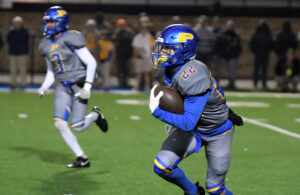The legend lives on
- Updated: October 12, 2018
Three decades on, the legend of Lyn St. James’ record-breaking run is still celebrated at Talladega

Lyn St. James is back in the car she took to numerous world speed records at Talladega in 1988 for a trip down memory lane Friday.
From staff reports
TALLADEGA – This NASCAR Playoff doubleheader weekend at Talladega Superspeedway marks 30 years since former IMSA GTP driver Lyn St. James earned a special place among drivers who have shattered records at the mammoth venue.
The longtime sports car racer stamped her name into the history books at 2.66-mile tri-oval in 1985 by driving a Ford Mustang Probe GTP Prototype to set the record as the first woman to surpass 200 mph on a closed course with a speed of 204.233 mph.
But little did anyone know that the performance would be just an appetizer for what she would accomplish three years later in one of Talladega’s most illustrious moments in motorsports history, setting even more world records by going even faster before her 1989 Thunderbird’s motor gave out.

Lyn St. James was back at Talladega Superspeedway Friday for the first time since 1988 when she set several world speed records in the car she’s standing beside.
She was back at the track for the first time since that record-breaking session Friday, in advance of the weekend’s Fr8Auctions 250 truck race and 1000Bulbs.com 500 Cup race.
“I had a flood of memories as I came in here,” she said. “This track is enormous and I had forgotten that. And, of course, it looks better now with people and cars.
“When we came here there was like nobody here. There’s nothing worse than being at a race track when there’s nobody here … and then you realize all these media and all the people who were here and they only had one car to watch and that was my car.
“It was just the weirdest feeling. I’d been here in ’85 when I set the records with the Probe, so I kind of got a sense of what it would be like, but that feeling of isolation (was different). … I kept looking around thinking, God, I wish they had some other cars going around or something, so it was a very tedious day.”
St. James’ date with history began in 1987 when St. James drove on the same team with two-time Talladega winner Bill Elliott en route to them winning that year’s 24 Hours of Daytona in the GTO team class. Later that year, Elliott would set NASCAR’s all-time qualifying mark at Talladega with a speed of 212.809 mph.
Since St. James was looking for a way to give herself a chance at earning a NASCAR ride, she contacted Ford, Goodyear, Elliott and his race team, and convinced them to build a race car specifically to set speed records at Talladega.
The project involved a Thunderbird with the incoming 1989 body style on a NASCAR chassis built by Ernie Elliott, Bill’s brother. Instead of using a NASCAR 5.7 liter engine, the car was given a 377 CID V8 engine and an ultra-low ride height. Any changes to the rest of the vehicle, which included to its rear roof, rear spoiler and frontal area, were made to “only look stock” and achieve aerodynamics that would minimize drag and maximize speed.
Because of the 200-mph speeds the Thunderbird was expected to go, the car had to be tested in a “proper moving-ground wind tunnel” and the results were mind-blowing. The car was ready for Talladega’s 33-degree banking and its speed records attempt in October 1988, but it was not until then that St. James sat in the car for the first time.
“The car was so heavy, and the tires were so small! I didn’t have a lot of feel,” she said. “As a race driver, you have to be able to adapt to different kinds of cars, that’s your job. But it had this great big steering wheel, and it was so heavy – I couldn’t feel a dorn thing!”
Once all of the necessary permits were finished, there were more than 40 international and national records St. James could either set or break.
To help prepare her for her mission, Elliott utilized a stock Thunderbird to take St. James around Talladega and discussed where she should be – and where she shouldn’t – on the track. He even made adjustments to the suspension and aerodynamics of the real Thunderbird race car. They also communicated frequently in the pits because the fuel cell only held 10 gallons.
“I’d come in and ask Bill what to do,” St. James said. “He’d say, ‘you just have to drive it deep into the turn until it takes a set.’ I’d say, ‘it doesn’t feel like it’s going to turn,’ and he’d say, ‘you just have to wait – it’ll turn all right.’
“Bill is not only an extremely talented race car driver, but he’s also known to be able to set up a car and make the adjustments when needed, which was invaluable.”
To make the task tougher, the mid-afternoon heat was not complimentary for breaking new speed records, and St. James says that if she lost speed from a little mistake, it would take her an entire lap just to get it back.
“It was so frustrating!” she exclaimed. “I felt like I never really figured it out.”
Despite these setbacks and her brief experience inside the car, St. James owned the moment on the first day, putting down the fastest lap ever by a woman on an oval track at 212.435 mph and setting 21 other international and national speed records.
St. James could have stopped with those achievements in hand, but she chose to strap in again the next morning (Oct. 11, 1988) when it was cool — much like the day Friday — and surpassed her own closed-course women’s speed record with 212.577 mph and a recorded top speed of 232.400 mph before the Thunderbird’s motor gave out. All told, St. James and her team set or broke 21 FIA international and national speed records, including 16 that could be held either by men or women.
In many ways, the record-breaking driving by St. James was a major milestone in the auto racing world, but it would end up being the catalyst for raising the bar in the sport. St. James held the title of the world’s fastest woman for only a matter of months until Patty Moise set a new closed-course women’s speed record in a specially-prepared Buick at 216.607 mph. Moise then broke the record again in 1990 at Talladega, clocking in at 217.498 mph.
St. James continued chasing her passion for speed, but there was a catch.
“The irony in this story is that my goal of convincing Ford that I could race stock cars didn’t happen,” she said.
A few weeks after making history at Talladega, she accepted an opportunity from team owner Dick Simon to drive an Indy car in a private rookie test. Four years later, she was Rookie of the Year at the Indianapolis 500.
The incredible feats St. James accomplished during her brief stock car experience 30 years ago changed motorsports and sealed her place in Talladega’s storied legacy. She would go on to win another 24 Hours of Daytona and the 12 Hours of Sebring, both in the GTO team class, in 1990, and become a vocal champion for women in racing and a mentor to many upcoming female drivers.
“I found my home driving open-wheel race cars on high-speed ovals,” she said. “I think those laps at Talladega, in first the Ford Probe and then the Ford Thunderbird, helped me to learn and like high-speed ovals.
“I have so much to be thankful for and grateful for the opportunities. Yes, I worked hard to earn those opportunities, but hard work doesn’t always get results. I love driving fast race cars fast!”
Cover photo of race car driver Lyn St. James sitting in her car by Lynn Pelham/The LIFE Images Collection/Getty Images courtesy Talladega Superspeedway









You must be logged in to post a comment Login